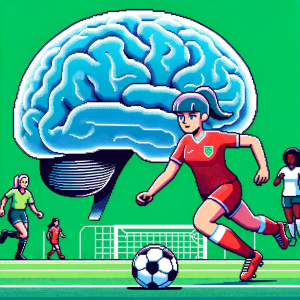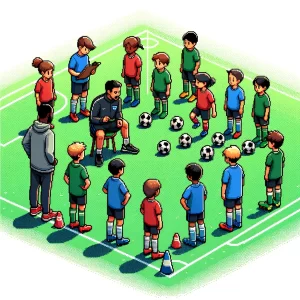
Elevating Soccer Coaching with Holistic Training
The world of soccer coaching is constantly evolving, driven by groundbreaking research that aims to enhance player performance. A recent study, titled Exploring a holistic training program on tactical behavior and psychological components of elite soccer players throughout competition season: a pilot study, published in the BMC Sports Science, Medicine and Rehabilitation, offers a fresh perspective on this front. This research provides valuable insights for soccer coaches and players alike, emphasizing the integration of psychological factors into tactical training.
The Essence of the Study
The study, conducted on U23 and U21 teams from an elite club in Argentina, offers a holistic approach to soccer training. It uniquely blends psychological aspects, such as emotional and cognitive components, with tactical behavior, a method not widely practiced in traditional coaching. Over five weeks, the research tested the impact of this integrated training on the players’ tactical actions during games. The results showed significant improvements in tactical behaviors, particularly in executing game principles like the first option to pass forward and immediate pressure when losing the ball.
Why This Matters for Soccer Coaching
For soccer coaches, the study’s findings highlight the importance of a training approach that goes beyond physical and technical aspects, delving into the mental and emotional realms of the game. Coaches can use these insights to:
- Develop More Resilient Players: By incorporating stress and adversity scenarios in training, players can be better prepared for high-pressure situations in matches.
- Enhance Tactical Decision-Making: Integrating cognitive aspects in training can improve players’ decision-making skills, crucial in high-stakes moments.
- Create Adaptable Players: This approach fosters adaptability, enabling players to respond effectively to the dynamic nature of the game.
Implementing the Study’s Findings
Translating these findings into practice involves a shift in coaching methodologies. Coaches need to create training environments that simulate real-game scenarios, focusing not just on physical prowess but also on mental agility and emotional resilience. This can involve:
- Scenario-Based Training: Incorporating various game-like scenarios in practice sessions to improve players’ tactical responses.
- Stress Management: Teaching techniques for managing stress and emotions, which are crucial during competitive matches.
- Focused Attention Drills: Including exercises that enhance concentration and attention, vital for tactical awareness.
The Bigger Picture
This study is not just about improving soccer skills; it’s about fostering holistic growth in players. By addressing the mental and emotional aspects of the game, coaches can develop well-rounded athletes who are not only technically proficient but also mentally and emotionally resilient. This approach can improve player development at all levels, from grassroots to professional leagues.
For Coaches and Players
Coaches looking to stay ahead of the curve should consider integrating these findings into their training regimes. Meanwhile, players can benefit from understanding the psychological aspects of their performance, embracing a more holistic approach to their development.
Elevate your understanding of the beautiful game with ‘This Week in Soccer’.
Dive into a world where soccer science and strategy come alive. Subscribe now to our newsletter and be part of a community that transforms theoretical knowledge into practical mastery. Don’t miss out on the chance to access groundbreaking insights and redefine your approach to soccer. Subscribe today!



